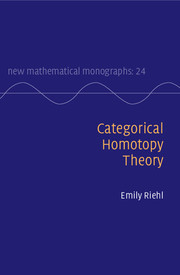Book contents
- Frontmatter
- Dedication
- Contents
- Preface
- PART I DERIVED FUNCTORS AND HOMOTOPY (CO)LIMITS
- PART II ENRICHED HOMOTOPY THEORY
- 7 Weighted limits and colimits
- 8 Categorical tools for homotopy (co)limit computations
- 9 Weighted homotopy limits and colimits
- 10 Derived enrichment
- PART III MODEL CATEGORIES AND WEAK FACTORIZATION SYSTEMS
- PART IV QUASI-CATEGORIES
- Bibliography
- Glossary of Notation
- Index
8 - Categorical tools for homotopy (co)limit computations
from PART II - ENRICHED HOMOTOPY THEORY
Published online by Cambridge University Press: 05 June 2014
- Frontmatter
- Dedication
- Contents
- Preface
- PART I DERIVED FUNCTORS AND HOMOTOPY (CO)LIMITS
- PART II ENRICHED HOMOTOPY THEORY
- 7 Weighted limits and colimits
- 8 Categorical tools for homotopy (co)limit computations
- 9 Weighted homotopy limits and colimits
- 10 Derived enrichment
- PART III MODEL CATEGORIES AND WEAK FACTORIZATION SYSTEMS
- PART IV QUASI-CATEGORIES
- Bibliography
- Glossary of Notation
- Index
Summary
In this chapter, we collect a few miscellaneous results aimed at simplifying computations of homotopy limits and colimits. Several of these techniques come directly from enriched category theory, providing further justification for our lengthy detour through the theory of weighted limits and colimits. The relative simplicity of the proofs in this chapter illustrates how easy it is to obtain computationally useful results with the theory we have developed. For instance, the reduction theorem, which provides a formula for the homotopy colimit of a restricted diagram, is an immediate corollary of a general result about colimits weighted by left Kan extensions.
After discussing a few simple applications of the theory of weighted limits and colimits to homotopy theory, we turn our attention directly to the base for enrichment. We observe that homotopy limits and colimits in a topological model category can be defined directly in that context without pulling the enrichment back to simplicial sets. Furthermore, our preferred models for the homotopy (co)limit functors are isomorphic in both cases, not merely weakly equivalent. Our arguments are formal and thus generalize to other enriched contexts.
Our final topic is the theory of homotopy initial and final functors, extending analogous results from ordinary and enriched category theory. In exploring this material, we take care to separate the homotopical results from the categorical (up-to-isomorphism) ones because we find such distinctions to be conceptually clarifying.
- Type
- Chapter
- Information
- Categorical Homotopy Theory , pp. 121 - 135Publisher: Cambridge University PressPrint publication year: 2014



